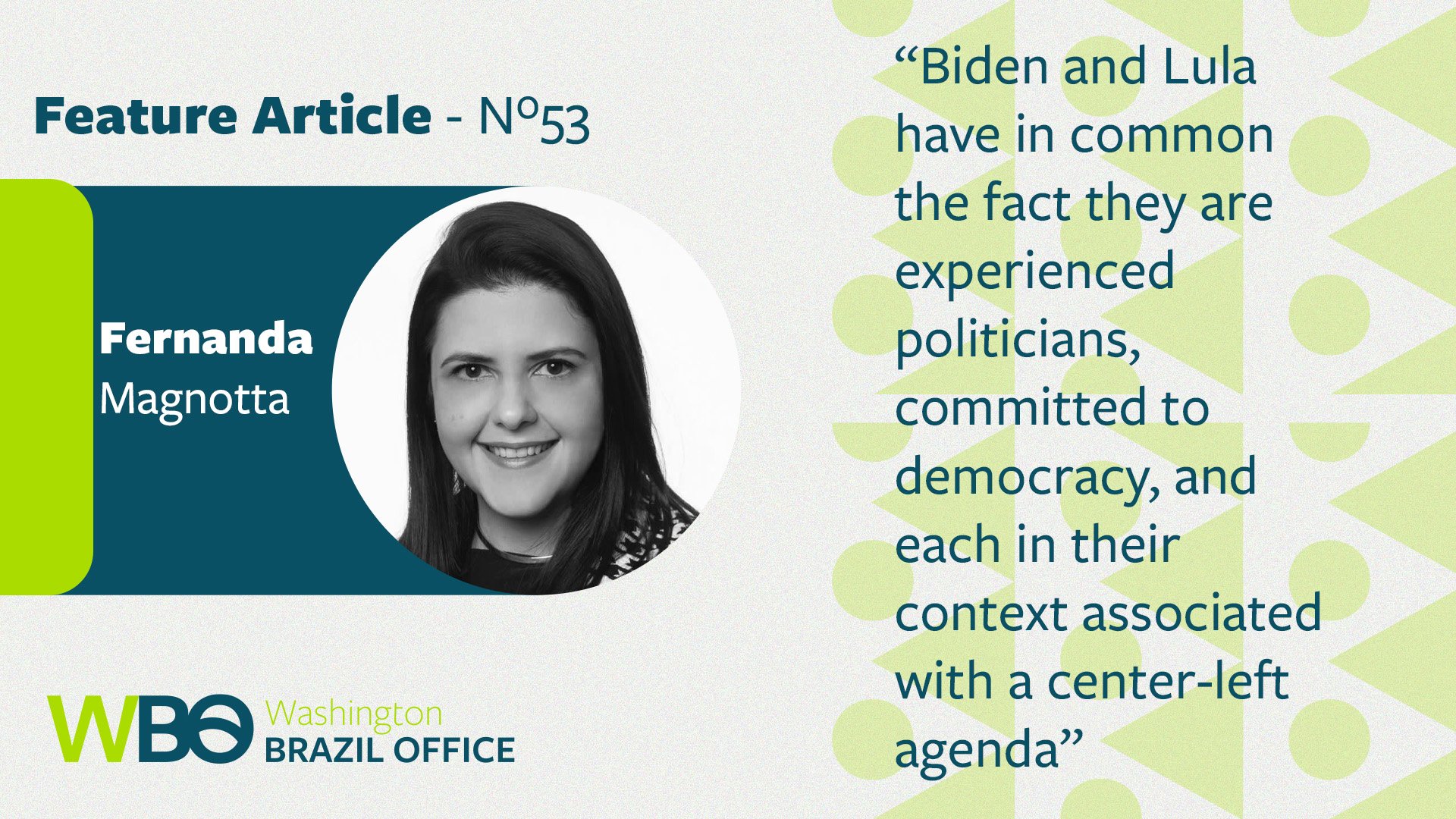Double-edged Sword: What Brings Together and What Separates Biden from Lula
Fernanda Magnotta holds a Ph.D. and a Master's degree from San Tiago Dantas (UNESP/UNICAMP/PUC-SP) in São Paulo, Brazil. Professor and coordinator of the International Relations program at FAAP, she is also an international politics columnist for UOL and a commentator for CBN radio. In 2022 she was a visiting scholar at the University of Southern California (USC) with a Fulbright grant. This text was originally written for issue 53 of the WBO Newsletter, published on February 10, 2023. Fill in the form at the bottom of the text to access and subscribe to the WBO weekly newsletter in English.
Over the past few years, we have become used to comparisons—and countless similarities—between Trump in the United States and Bolsonaro in Brazil. Almost intuitively, as a consequence, some describe the opponents of these leaders as comparable figures as well. But there is a false equivalence here.
Biden and Lula have in common the fact they are experienced politicians, committed to democracy, and each in their context associated with a center-left agenda.
In unstable times, accentuated by Bolsonaro's "automatic alignment" with Trumpism, there are, of course, common challenges both countries current face:
The need to defend national interests against the interests of the radical right;
The necessity of dealing with the effects of populism, nationalism, and anti-globalism;
The importance of fighting the anti-establishment narrative and politics of resentment;
The need to deal with disinformation, domestic polarization, and international isolation.
In addition to these internal issues, bilateral relations between Brazil and the United States are considered strategic and very important. The two countries have maintained deep and broad political and economic ties throughout history. Following Brazil's Independence in 1822, the United States was among the first to recognize Brazil in 1824. They are the two largest democracies in the Western Hemisphere. Brazil is the world's twelfth-largest economy, and the United States is Brazil's second-largest trading partner.
The United States and Brazil have many shared interests as our diplomacy always states:
The commitment to sustainable economic growth and prosperity;
The promotion of international peace, security, and respect for human rights;
The protection of the environment and biodiversity;
The strengthening of defense and security cooperation.
Despite all this, Lula and Biden are different, mainly because they represent countries with very asymmetric capabilities and undeniably distinct international challenges.
“Lula is not modest. He sees in Brazil the potential for global influence. He oriented his foreign policy in that direction in his two previous terms and, at one point, bothered the established powers”
The United States is a superpower in relative decline, facing a hegemonic transition process. Still, it is the most significant military power in the world, one of the most developed economies on earth, and the official sponsors of the current international order, created in its image and likeness. Brazil, a mid-sized power, aims to regain a regional leadership that has been severely shaken in recent years. It is also a country with ambitions of a more inclusive international system.
Lula is not modest. He sees in Brazil the potential for global influence. He oriented his foreign policy in that direction in his two previous terms and, at one point, bothered the established powers.
At the same time, the Brazilian president knows that the Brazil of 2023 is not the Brazil of 2003. The international scenario is unfavorable due to the pandemic, developed countries' inflation, and Ukraine's war. Brazil has one of the most conservative congresses in its history. Bolsonarism came out of the last election very strong: it elected the largest number of politicians to public offices. Brazil has become a more polarized society, and the government needs to dialogue with new relevant groups: the military, evangelicals, etc. There is no commodities boom nor is there the macroeconomic stability of the Real Plan, as there was twenty years ago. Ultimately, the country's fiscal situation is very delicate: attracting investments will be a challenge, as will controlling government spending.
Lula's campaign has emphasized the importance of reinitiating an active foreign policy since the very first document released before the election. During the Workers’ Party’s past administrations, Chancellor Celso Amorim was one of the most influential advisors of the president. Together they have emphasized strengthening Brazilian sovereignty and defending the idea that Brazil is a country that seeks to be internationally respected. Amorim is now no longer the Minister of Foreign Affairs, but he has been given an office next to Lula's, in Brasília, where he is the president's special advisor.
Lula believes in dialogue with all countries and defends that under his government, Brazil will not submit to third parties, highlighting the resumption of South-South cooperation with Latin America and Africa. MERCOSUR, UNASUR, CELAC, and BRICS will be central to his foreign policy.
Since his victory, Lula has talked about restoring the country's international credibility with Brazil sitting at the most important international negotiating tables. He especially emphasized the regional and multilateral dimensions of his foreign policy and the importance of environmental issues.
With that in mind, we expect US-Brazil relations to be friendly, as in Lula's previous administrations, guided by an economic pragmatism that interests both countries. There is, for sure, plenty of room for dialogue with Biden, whom Lula knows very well.
Despite this, it does not mean that the two countries will experience a hassle-free exchange since, ultimately, divergent positions may appear, primarily when Brazil seeks greater autonomy in the international field or when the topic involves strategic alliances.
What should we pay attention to in this regard? On the list of sensitive issues with potential tensions are:
1. negotiations that involve BRICS partners, such as China and Russia;
2. the admission to the OECD, and protectionism;
3. relations with Venezuela and regional arrangements in South America.
The way is open for a constructive dialogue, but betting on obvious consensus is an illusion.

